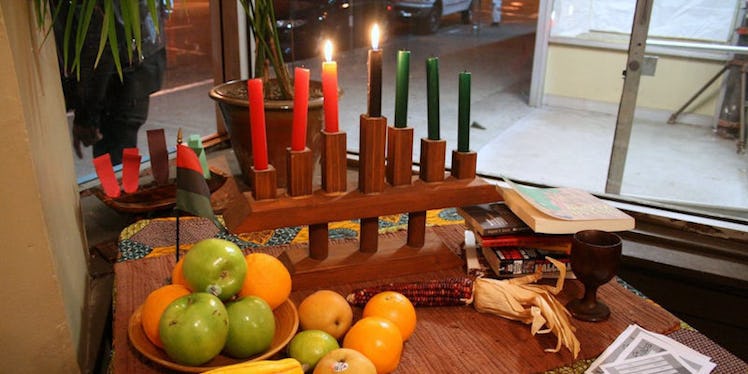If you're still trying to figure out what the "kwanzi" part of Chrismakwanzika is all about, don't worry.
You're not the only one.
While Kwanzaa may not be on the tip of your tongue this holiday season, its seven principles for building family and community are universally relevant.
Unlike the other holidays in December that are probably bleeding your bank account dry, Kwanzaa isn't a religious holiday.
It's a secular holiday that celebrates African-American culture and life.
You don't have to be African-American to learn from its teachings, though, and here are the ways the seven principles of Kwanzaa apply to all of us (no matter what else you believe in).
1. Unity
The first principle is unity of the family, community, nation and race.
If there's a principle we need right now, it's this one.
When our news feeds are filled with racism, bickering and unspeakable atrocities, it can be nearly impossible to retain a sense of unity.
The first day of Kwanzaa reminds us unity is a choice, and it's one we can make each and every day.
Take that, Donald Trump.
2. Self-Determination
The second principle is to define ourselves, name ourselves, create for ourselves and speak for ourselves.
Far too often, we allow ourselves and our lives to be determined or led by others.
This principle reminds us to develop and use our own voices.
In a year where women had to #ShoutYourAbortion and #SayHerName, this reminder is particularly poignant.
3. Collective Work And Responsibility
The third principle is to build and maintain community together, and to take each other's problems on and solve them as our own.
If that reeks of socialism to you, then good.
A sense of collective responsibility builds accountability and investment in our communities, and it encourages us to view our successes and failures as shared rather than individual.
4. Cooperative Economics
The fourth principle is to build and maintain our own stores and businesses and to profit from them together.
I know; it's more socialism, but stay with me here.
When we maintain individual ownership and control of our businesses, but accept our economies are cooperative, businesses do their part to give back to the economy as a whole.
If that still sounds bad to you, imagine if corporate tax breaks were replaced by family tax breaks, and I'm guessing you'd change your tune.
5. Purpose
The fifth principle, Nia, is to find purpose through the shared work of building community.
If your daily life begins with an alarm clock, is punctuated with mundane tasks and ends with watching Netflix in bed at night before you do it all again the next day, the struggle to find purpose probably isn't new to you.
In American culture, the solution to feeling purposeless is usually to do more for yourself.
Nia tells us the solution to purposelessness is to stop looking inward and to start looking outward.
Only good things can happen when we search for meaning and purpose in our communities, instead of viewing ourselves as islands.
6. Creativity
The sixth principle is to do whatever we can to leave our community more beautiful and beneficial than we found it.
President John F. Kennedy once challenged the American people,
Ask not what your country can do for you; ask what you can do for your country.
That idea may have gotten lost somewhere along the way, but the sixth principle of Kwanzaa reminds us it is up to each of us to find ways to turn our gifts into improvements for our communities.
7. Faith
The seventh and final principle is faith, but not in God.
For the African people, this principle reminds them to place their faith in their parents, teachers and community leaders, while also trusting in the righteousness of their struggle.
While we may not share their struggle, having faith in each other and even our nation reinforces the sense of unity and community that Kwanzaa is all about.
For the TL;DR crowd, Kwanzaa's seven principles are about pulling your head out of your own ass and figuring out how you can contribute to your community.
There's also some really legit food.
